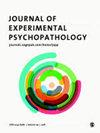抑郁症状与目标实现的积极情绪预期的关系
IF 1.9
4区 医学
Q4 PSYCHIATRY
引用次数: 0
摘要
抑郁症与追求目标的困难有关,这可能与对目标成功的情绪预期不足有关。因此,报告的研究调查了对个人目标的情绪预期,以及这是否与抑郁症状有关。在列出接近和回避目标后,263名参与者对这些目标(如实现的可能性和可控性)进行了预测,并对他们设想目标实现的生动性和视角进行了评级。他们还提供了预期(伴随目标成功的预测情绪)或预期(想象目标成功时的即时情绪)积极情绪的评级。抑郁症状学水平较高与对目标实现的悲观预测有关,再加上在设想成就时生动性降低和更多地采用观察者视角。此外,那些经历了更高水平抑郁症状的人在与目标成功相关的预期和预期积极情绪方面都存在偏见。他们认为,实现目标会降低他们的积极情绪水平,在思考实现目标时,他们也会减少当下的幸福感、满足感和愉悦感。无论抑郁症状水平如何,预期情绪通常比预期情绪更强。这些发现对研究面向未来的情绪(预期和预期)以及开发治疗抑郁症的技术都有意义。本文章由计算机程序翻译,如有差异,请以英文原文为准。
The relationship between depressive symptoms and positive emotional anticipation of goal achievement
Depression is associated with difficulties in goal pursuit which could be related to deficits in emotional anticipation regarding goal success. Therefore, the reported study investigated emotional anticipation for personal goals and whether this differs as a function of depressive symptoms. After listing approach and avoidance goals, 263 participants made predictions about these goals (e.g. likelihood of achievement and controllability) and rated the vividness and perspective with which they envisaged goal achievement. They also provided ratings of either anticipated (predicted emotions that would accompany goal success) or anticipatory (in-the-moment emotions when imagining goal success) positive emotions. Higher levels of depressive symptomatology were associated with pessimistic predictions about goal achievement, coupled with reduced vividness and greater adoption of observer perspective when envisaging achievement. Furthermore, those experiencing higher levels of depressive symptoms evidenced biases in both anticipated and anticipatory positive emotions associated with goal success. They believed that goal achievement would bring them lower levels of positive emotion and also reported less in-the-moment happiness, satisfaction, and pleasure when thinking about achieving their goals. Irrespective of depressive symptom level, anticipated emotions were generally stronger than anticipatory emotions. These findings have implications both for research on future-oriented emotions (anticipated and anticipatory) and for the development of therapeutic techniques to aid depression.
求助全文
通过发布文献求助,成功后即可免费获取论文全文。
去求助
来源期刊

Journal of Experimental Psychopathology
Medicine-Psychiatry and Mental Health
CiteScore
2.00
自引率
0.00%
发文量
19
审稿时长
11 weeks
期刊介绍:
The Journal of Experimental Psychopathology (EPP) is an open access, peer reviewed, journal focused on publishing cutting-edge original contributions to scientific knowledge in the general area of psychopathology. Although there will be an emphasis on publishing research which has adopted an experimental approach to describing and understanding psychopathology, the journal will also welcome submissions that make significant contributions to knowledge using other empirical methods such as correlational designs, meta-analyses, epidemiological and prospective approaches, and single-case experiments.
 求助内容:
求助内容: 应助结果提醒方式:
应助结果提醒方式:


